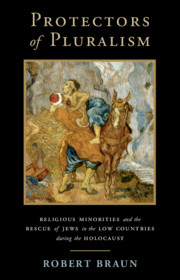
-
Select format
-
- Publisher:
- Cambridge University Press
- Publication date:
- March 2019
- March 2019
- ISBN:
- 9781108633116
- 9781108471022
- 9781108456975
- Dimensions:
- (228 x 152 mm)
- Weight & Pages:
- 0.58kg, 316 Pages
- Dimensions:
- (228 x 152 mm)
- Weight & Pages:
- 0.46kg, 316 Pages
- Subjects:
- Area Studies, Politics: General Interest, American Studies, Sociology: General Interest, American Government, Politics and Policy, Political Sociology, Politics and International Relations, Sociology
You may already have access via personal or institutional login- Subjects:
- Area Studies, Politics: General Interest, American Studies, Sociology: General Interest, American Government, Politics and Policy, Political Sociology, Politics and International Relations, Sociology
Book description
Protectors of Pluralism argues that local religious minorities are more likely to save persecuted groups from purification campaigns. Robert Braun utilizes a geo-referenced dataset of Jewish evasion in the Netherlands and Belgium during the Holocaust to assess the minority hypothesis. Spatial statistics and archival work reveal that Protestants were more likely to rescue Jews in Catholic regions of the Low Countries, while Catholics facilitated evasion in Protestant areas. Post-war testimonies and secondary literature demonstrate the importance of minority groups for rescue in other countries during the Holocaust as well as other episodes of mass violence, underlining how the local position of church communities produces networks of assistance, rather than something inherent to any religion itself. This book makes an important contribution to the literature on political violence, social movements, altruism and religion, applying a range of social science methodologies and theories that shed new light on the Holocaust.
Awards
Winner, 2020 Charles Tilly Book Award, American Sociological Association
Reviews
‘Braun’s book should be of considerable interest to organizational scholars, who have increasingly come to situate the selection of organizational activities within a spatial and historical context.’
Martin Ruef Source: Social Forces
Contents
Metrics
Full text views
Full text views help Loading metrics...
Loading metrics...
* Views captured on Cambridge Core between #date#. This data will be updated every 24 hours.
Usage data cannot currently be displayed.
Accessibility standard: Unknown
Why this information is here
This section outlines the accessibility features of this content - including support for screen readers, full keyboard navigation and high-contrast display options. This may not be relevant for you.
Accessibility Information
Accessibility compliance for the PDF of this book is currently unknown and may be updated in the future.


